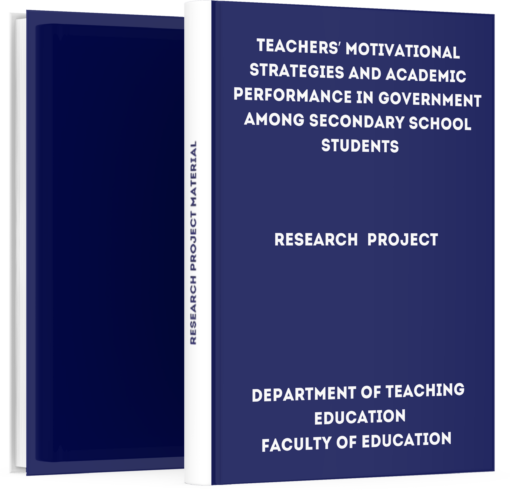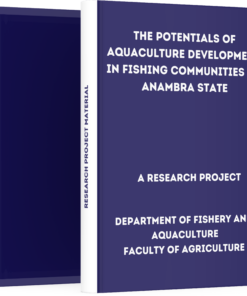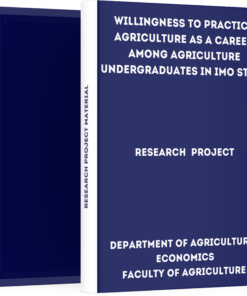Teachers’ Motivational Strategies and Academic Performance in Government among Secondary School Students
₦3,000.00
If you are interested in getting this project material “Teachers’ Motivational Strategies and Academic Performance in Government among Secondary School Students”, click on the DOWNLOAD BUTTON to make payment and the file will be delivered to your email immediately after confirmation.
Description
– Teachers’ Motivational Strategies and Academic Performance in Government among Secondary School Students –
Download Teachers’ Motivational Strategies and Academic Performance in Government among Secondary School Students. Students who are writing their projects can get this material to aid their research work.
Abstract
The study “Teachers motivational strategies and students academic performance in Government among secondary school students in Ikono Local Government Area” was carried out by me.
Two research questions and their corresponding hypothesis were formulated to guide this study. The study adopted an experimental research design. Five hundred and seventy seven (577) students formed the population of the study.
A simple random technique was adopted to select two hundred (200) respondents for the study. Government Achievement Test was the major instrument used for the data collection. The data generated from the instrument was analyzed using independent t-test statistics.
The result show that there is significant difference between academic performance of students taught Government by teachers who give frequent reward to their students and those who do not give.
It also revealed that there is significance difference in the academic performance of students whose test scripts are marked and those whose test scripts are not marked and returned in Government.
The study therefore recommended that Government teachers should increase students’ academic achievement by using different motivational strategy such as teacher’s rewards, marking and returning test scripts etc.
Introduction
1.1 Background of the Study
Motivation is a factor in the realization of the objectives of education in Nigerian secondary schools. Inadequate use of motivation by teachers therefore may go a long way in decreasing students’ interest in learning Government.
Patrick (2013) refers to motivation as an act that causes a person to act or do something. Olabaji (2007) views motivation as an incentive which incites, inspires and promotes the desire for the individual learning.
It is also make the study interesting to students. The learning environment and teachers’ motivation upon knowledge development needs attention in the field of government teaching and learning.
What happens in the class room between the teacher and learners (motivation-wise) has huge psychological implication on student’s academic performance and opportunity to learn. The concept of teachers’ motivation on students’ academic performance remains a vital topic throughout all levels of education.
Various approaches which a teacher use in motivating students have been articulated in education circles but educators are still coming to terms with best-fit models to inspire students in classroom settings.
According to Alexandra (2000), motivational strategies could arouse interest, enthusiasm, and regulate the student’s behaviour in order to perform different tasks with interest for attainment of educational goals.
Critically, teachers’ motivation can be classified into intrinsic motivation and interest in activities pressure. It is the foundation of having enjoyment in performing activity without any external incentive.
Whereas individuals who are extrinsically motivated need reward which can be in the form of grades and marks in examination or test. Achievement motivation is concerned with achieving the successful outcomes at the end of the process.
According to Oziki (2012) availability of teaching/learning resources and teachers’ motivation enhances the effectiveness of schools as these are basic things that can bring about good academic performance in the students.
In teaching-learning process with the help of the teachers’ motivational strategy can maintain, control and arouse interest of the learners. A leaner is motivated by the support of his concern with the ongoing activities and interest. In education, motivation is implemented in terms of what and how students learn about the subject matters.
How to Download this Project Material
First, note that we are one of the best and most reliable online platforms because we don’t retain any of your personal information or data as regards making payments online.
PRICE: ₦3,500 ₦3,000 (Three Thousand Naira Only)
Make a bank deposit or mobile transfer of ₦2,000 only to the account given below;
Bank Name: UBA Account Number: 1022564031 Account Name: TMLT PRO SERVICES
After making the payment, CLICK HERE to send the following on WhatsApp;
- Depositor’s Name or Screenshot of Payment
- Name of the Past Question
- Active Email Address
or Call Us On +2348082284439 Once your details have been received and your payment confirmed by us, you will receive the past question in your email or WhatsApp within 5 Minutes.
Guarantee of Getting the Material
We understand that due to the high rate of fraud, many people are afraid of making purchases online but be rest assured that PastExamQuestions will deliver your material after payment.
Once your details have been received and your payment confirmed by us, you will receive the past question in your email or WhatsApp.
Give us Feedback
Have we been able to satisfy you? How well do you think the material will be helpful after having gone through it? Does the price worth the material?
Let’s hear from you! We recommend that our customers give feedback at the end of every transaction to enable us to serve better. You can do this by clicking the review button on this page.
Where is the review button? >> Just scroll up to where you see reviews





Reviews
There are no reviews yet.